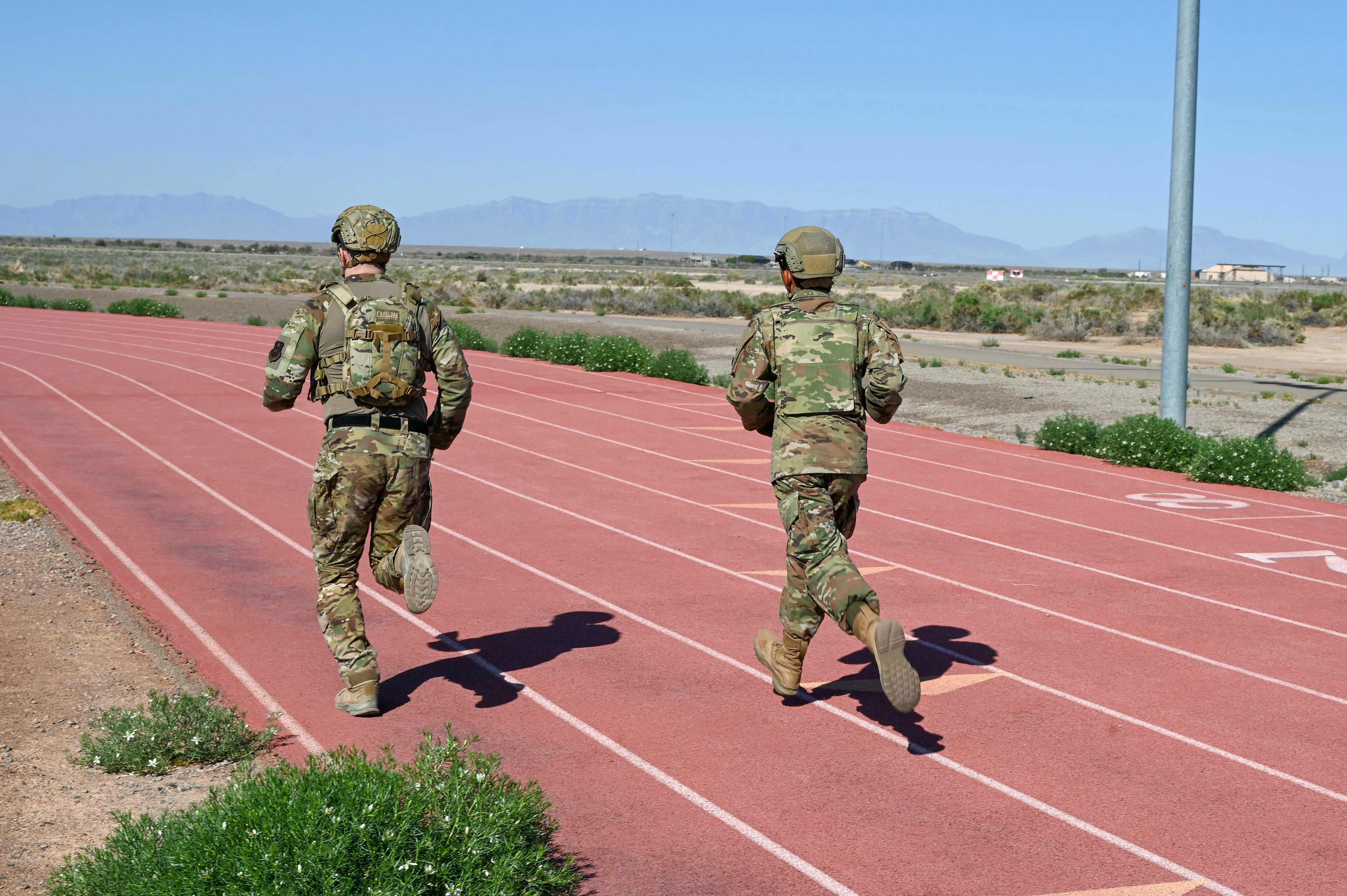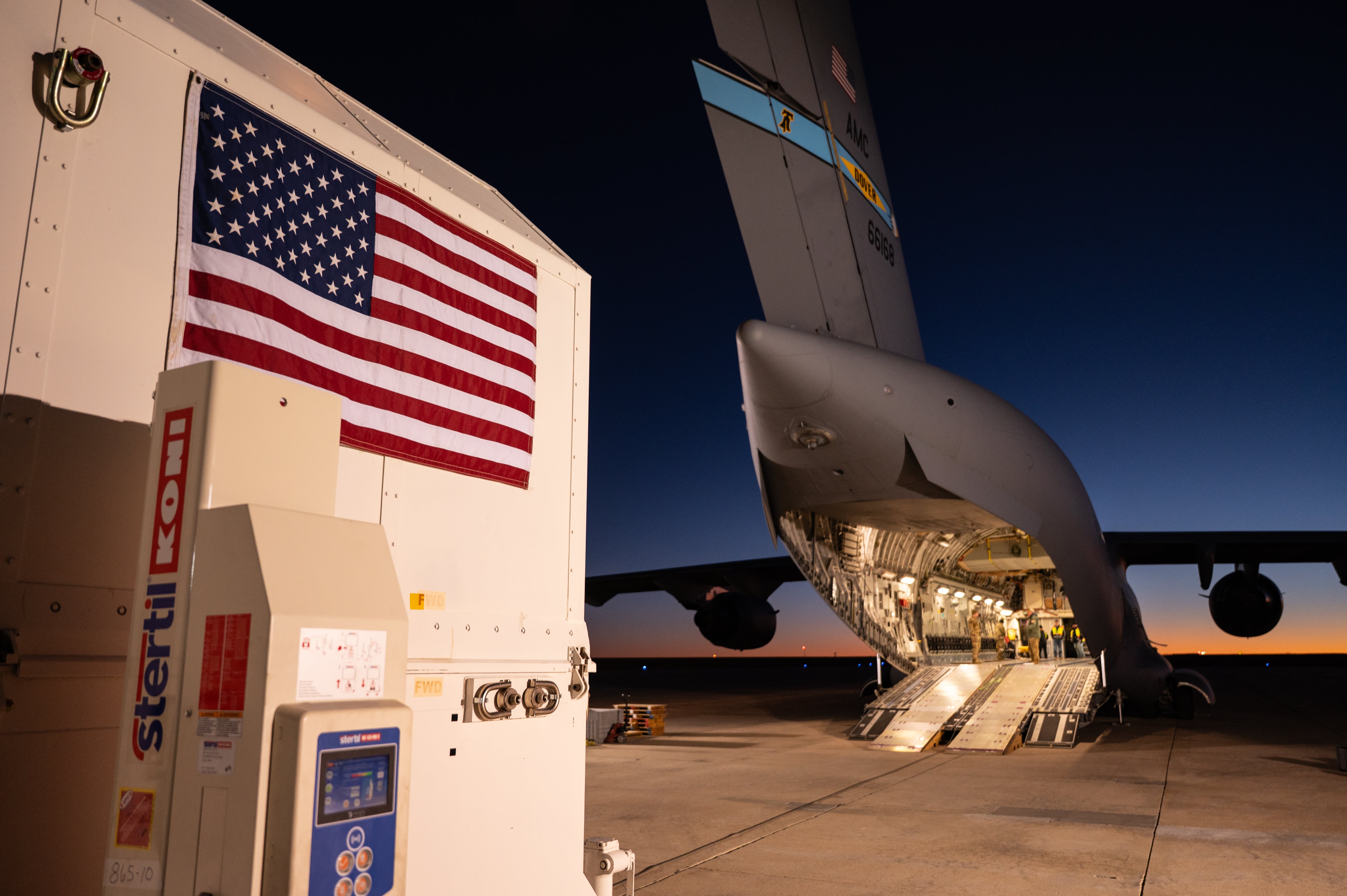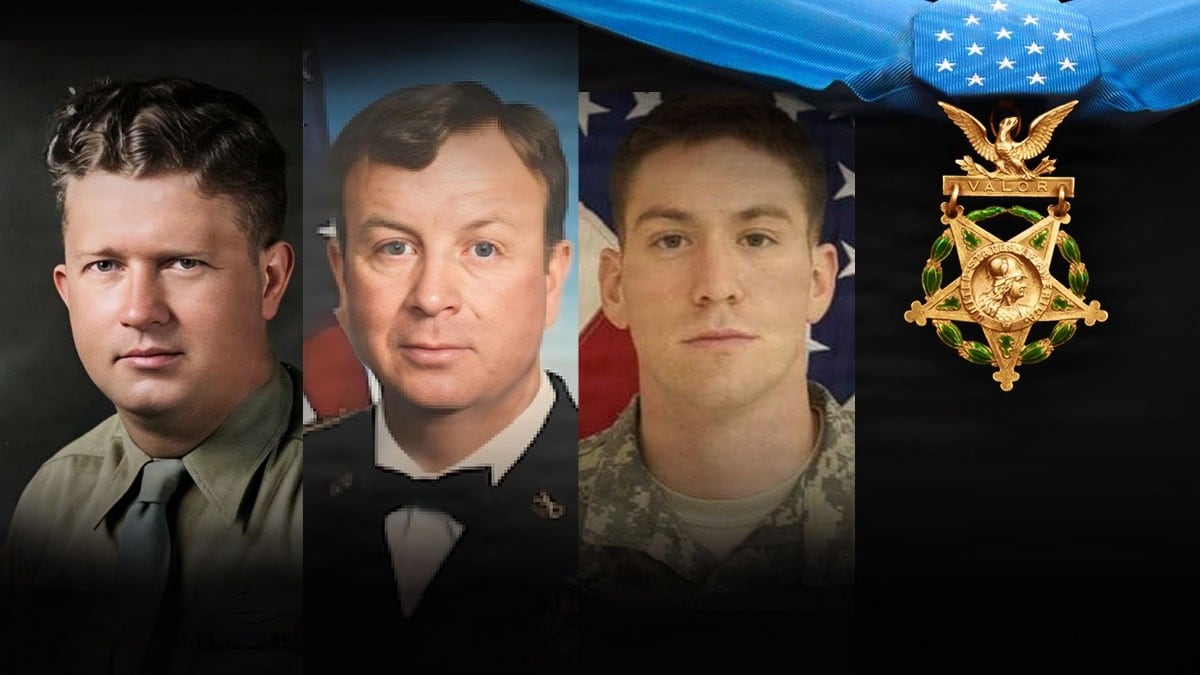The number of Guard troops mobilized in the effort to cope with the coronavirus pandemic continues to increase.
There are more 43,300 Air and Army National Guard professionals supporting the COVID-19 crisis response at the direction of their governors as of Thursday afternoon. That’s an increase of about 1,700 from Wednesday.
In addition, 40 states, three territories and the District of Columbia have now been approved for use of federal funds for state missions under Title 32.
As of Thursday morning, 734 Guard troops had tested positive for COVID-19, according to the latest figures provided by the Pentagon. That was an increase of 29 from Wednesday.
Of those troops activated in the COVID-19 response, 35,100 are currently under orders authorized for Title 32 502(f) status, said Army Master Sgt. W. Michael Houk, a spokesman for the National Guard Bureau. That’s an increase of about 2,800 troops over the past few days.
“As states amend orders and issue new ones based on their needs this number will keep moving,” he told Military Times. "Also based on response needs, as determined at the state level, some orders may remain under state active duty."
The status, ordered by President Donald Trump, means the federal government is picking up 100 percent of the cost, with control remaining in the hands of governors. It also means that those troops — risking thier health and that of their families by being on the front lines of the coronavirus fight — receive healthcare and increased housing allowance equal to active duty and reserve troops doing the same work.
There was an initial catch. Only troops on 31-day orders were eligible for the increased benefits. That problem, however, was since fixed by Trump and now states are going through the process of either initiating or amending those orders to meet the 31-day requirement for increased troop benefits.
In addition to those on Title 32 orders, there are also about 7,900 Guard troops acorss the nation on State Activated Duty who are not receiving increased benefits.
RELATED
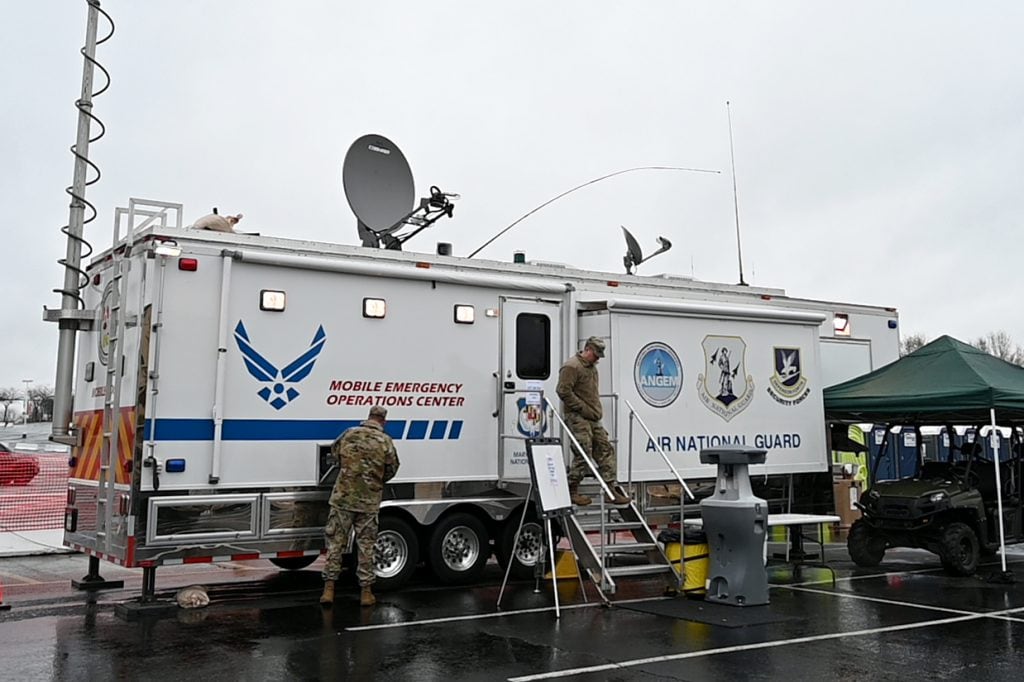
National Guard officials highlighted some of their efforts:
Connecticut National Guard Airman 1st Class Arielle Robles, 103rd Maintenance Group administration specialist, typically reports to Kaiser Hall for her exercise science classes at Central Connecticut State University. Now she is helping turn the gym floor into a COVID-19 recovery center.
“It’s crazy to see that where we would normally go for class or to work out is being turned into a field hospital, but it feels good to be helping the community and my school in this way,” said Robles.
RELATED
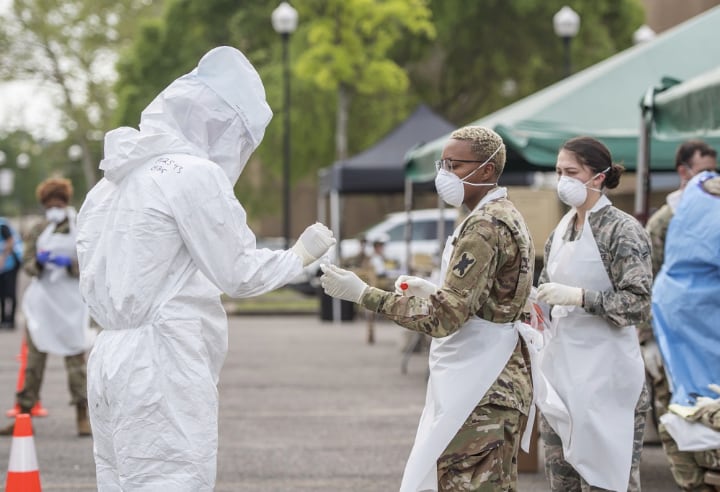
Current National Guard COVID-19 response missions include, but are not limited to:
*Full-time, 24-hour state Emergency Operations Center staffing to synchronize National Guard efforts with local and state mission partners to plan and execute an effective response;
*Flying ventilators and other critical equipment to support response efforts in other states;
*Providing mortuary affairs assistance as needed with dignity and respect;
*Providing time saving support to local law enforcement, freeing officers to perform their duty in the communities they serve;
*Conducting force health protection assessments to ensure our Guardsmen are taken care of;
*Manufacturing, sewing and distributing masks for mission essential personnel;
*Building and outfitting alternate care facilities to alleviate stress on medical infrastructure;
*Supporting warehouse operations and logistics efforts to help deliver and distribute lifesaving medical equipment and critical supplies;
*Delivering and distributing food in hard-hit communities and supporting food banks;
*Manning call centers to be a knowledgeable and calming voice;
*Providing vital personal protective equipment training and delivery to civilian first responders;
*Performing sample collection and delivery to medical personnel;
*Providing support and symptoms screening to testing facilities and passenger terminals;
*Providing transportation and assessment support to healthcare providers
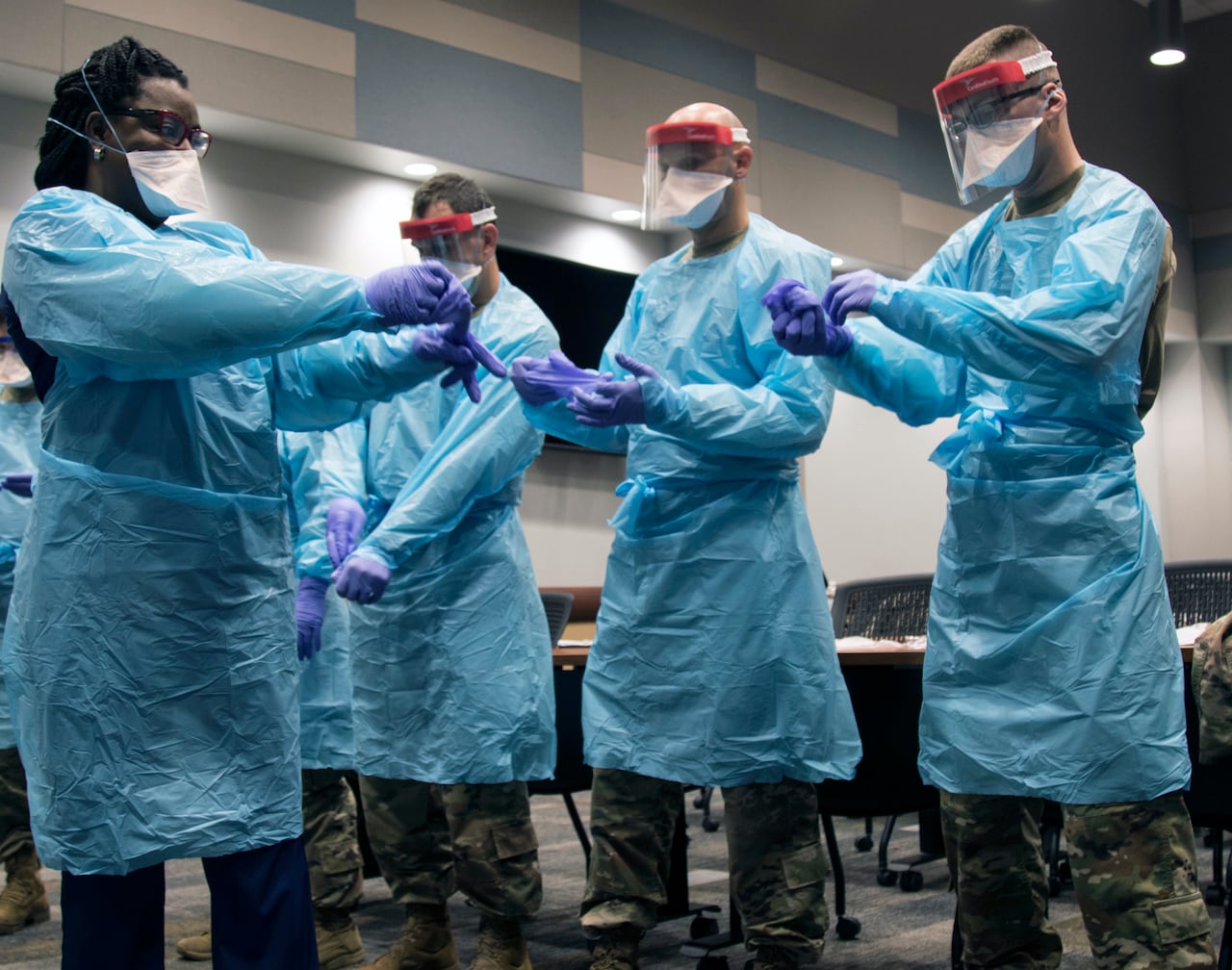
Here are the latest updates of National Guard actions across the United States and its territories:
Alabama
The Alabama National Guard is conducting infection control missions in designated long-term care facilities to include nursing and veterans’ homes throughout the state. Additionally, the Alabama National Guard is continuing to conduct medical and logistical support operations at the Alabama Unified Command Operations Center
Florida
The Florida National Guard has more than 2,895 soldiers and airmen in a mobilized status.
The FLNG continues supporting 10 community-based testing sites and mobile testing teams supporting special populations at long-term care facilities throughout Florida. To date, the FLNG has assisted in the testing of more than 67,840 individuals at community-based testing sites and collected 4,730 samples from long-term care facilities.
Additionally, more than 90 FLNG medical professionals are supporting the U.S. Army Corps of Engineers’ alternate care facility at the Miami Beach Convention Center. The medial team conducted various advanced life support and basic life support staff training drills April 22.
Maryland
The Maryland National Guard is preparing and delivering meals to emergency encampments for homeless people displaced due to COVID-19.
Massachusetts
Massachusetts National Guard units have logged more than 23,000 miles transporting PPE to police, fire departments, hospitals and nursing homes
Michigan
More than 795 Michigan National Guard soldiers and airmen are actively supporting the state's COVID-19 response, with an additional 6,600 service members ready to assist. Across 13 counties, members of the National Guard are supporting requests from local communities and state agencies. Response missions include food distribution, screening operations, reception and staging, supply and logistics management, state Emergency Operations Center staff augmentation, and alternate care facility support.
Joint Task Force – Michigan includes Guardsmen to coordinate National Guard response efforts across the state.
Missouri
National Guard men and women are assisting the Missouri Department of Elementary and Secondary Education in delivering food to students in rural areas.
Montana
Montana National Guard members are performing temperature screening at 11 airports and train stations across the state.
New York
The New York National Guard has more than 3,625 personnel on mission across the state, joint task forces to support state and local governments with logistics management, warehouse operations. They also provide medical staff at Javits Center and New York City hospitals, and testing sites.
New York National Guard members continue to manage the Javits site as the unified command post for the multi-agency response. To date, more than 1,055 patients have received care at the Javits NY Medical Station.
*New York Air National Guard pararescue airmen, who are trained as emergency medical technicians, from New York’s 106th Rescue Wing, are also assisting in city hospitals.
*The NYNG is supporting the alternate care facility at the South Beach Psychiatric Center on Staten Island. Additional forces are providing support at three other potential alternate care sites on Long Island or Westchester.
*NYNG continues to support 10 drive-through testing sites. Guardsmen supported more than 3,710 test appointments April 21, as bad weather caused a reduction in the number of people tested. The sites are located at: SUNY Stony Brook; Jones Beach State Park; Staten Island; Glen Island State Park in Westchester County; Anthony Wayne Service area in Rockland County; Lehman College and the Bay Plaza Mall in the Bronx; Aqueduct Racetrack in Queens; Flatbush in Brooklyn; and the SUNY Albany campus in Albany. Soldiers and airmen are collecting samples and providing general-purpose support at the testing locations. National Guard personnel continue packaging and distributing food today in the Bronx, Brooklyn, Queens, Staten Island and Manhattan in New York City, and in Yonkers, providing 134,790 meals on April 21. To date, soldiers have distributed nearly 1.9 million meals.
*Similar missions resume today in Westchester County, where Guardsmen provided 78,311 meal packages and Albany County where 2,090 meals have been delivered to quarantined residents or picked up as of April 21.
*Soldiers helping to process and ship goods at the regional food bank in Schenectady delivered 292 meals April 21. A similar food distribution mission began April 21 in Chenango County, where 700 meals were distributed. An additional food support mission will begin April 24 in Montgomery County.
*New York soldiers and airmen continue conducting logistics missions, including warehousing and commodity distribution of medical supplies at six sites in the Hudson Valley, the Albany area, and Mohawk Valley.
*Soldiers distributed 3.5 million protective masks to five counties, and moved another 120 pallets of supplies.
*Hand sanitizer delivery continues to 16 locations today. April 21, 1,510 gallons were distributed 16 locations in the lower Hudson Valley. A total of 38,669 gallons of sanitizer have been delivered to local governments.
*The National Guard continues to provide logistics support to the Office of the Chief Medical Examiner of New York City. National Guard personnel are working with members of the Medical Examiner’s Office to assist in the dignified removal of human remains when required. The support mission also includes assistance to the Westchester County Medical Examiner. A similar mission is expected to begin in Orange County.
*NYNG soldiers continue to man phones at two New York City call centers, including one for the New York City Division of Veterans Services. Soldiers also continue to provide administrative support at two New York City 911 call centers.
*Soldiers continue packaging COVID-19 test kits for the New York State Department of Health at the Wadsworth Laboratory in Albany. They assembled more than 24,800 kits April 21 for distribution across the state. The team has built 328,650 testing kits since starting the mission.
Oklahoma
The Oklahoma National Guard is distributing critical medical supplies from the Strategic National Stockpile warehouse to facilities state-wide
West Virginia
Currently, more than 695 West Virginia National Guard members are on duty supporting the state’s COVID-19 response. To date, the WVNG has completed 582 missions across the state.
The Guard continues to make progress in testing all nursing home facilities in the state. This is a coordinated effort with the West Virginia Department of Health and Human Resources and the West Virginia Health Care Association.
WVNG personnel tested more than 120 staff members Morgantown Health and Rehabilitation, facility. This marks the third facility to undergo testing by the WVNG this week and to date, this team has tested 1,217 people as a part of their response mission.
The WVNG will also assist in COVID-19 testing at numerous state hospitals starting April 23 and week’s end will have completed four of the seven locations in the state.
In addition to conducting COVID-19 testing for nursing homes, Guardsmen continue providing PPE wear training to long-term care facilities and plan to visit 10 locations April 23. Members are also providing assistance for COVID-19 drive through testing lanes and to date, have trained 637 stores, 2,778 personnel and 45 medical or long-term care facilities.
West Virginia Guard personnel assisting in sanitization lanes for first responder and public transport vehicles have sanitized 97 vehicles in two locations – Huntington and Charleston – which includes ambulances, police vehicles and public transport buses.
Guardsmen have delivered 500 sanitized N95 masks to Thomas Health Systems in Charleston. An additional 200 N95 masks will be sanitized today using the WVNG’s mobile hydrogen peroxide vapor sanitizing trailer.
Task Force Sustainment continues their mission of distributing PPE to various county emergency managers and will pick up 32 drums of hand sanitizer to be broken down and distributed where needed.
Members of the WVNG packed 2,254 meals at the Mountaineer Food Bank and 360 family meals at the Facing Hunger Foodbank April 21. In addition, they will deliver 4,520 meals to Greenbrier, Raleigh and Ohio Counties April 22.
This story will continue to be updated as the National Guard Bureau releases daily reports on National Guard activities nationwide. If you or someone you know is in the National Guard responding to COVID-19, and would like to talk about your experience, please contact Military Times managing editor Howard Altman, haltman@militarytimes.com.
Howard Altman is an award-winning editor and reporter who was previously the military reporter for the Tampa Bay Times and before that the Tampa Tribune, where he covered USCENTCOM, USSOCOM and SOF writ large among many other topics.

